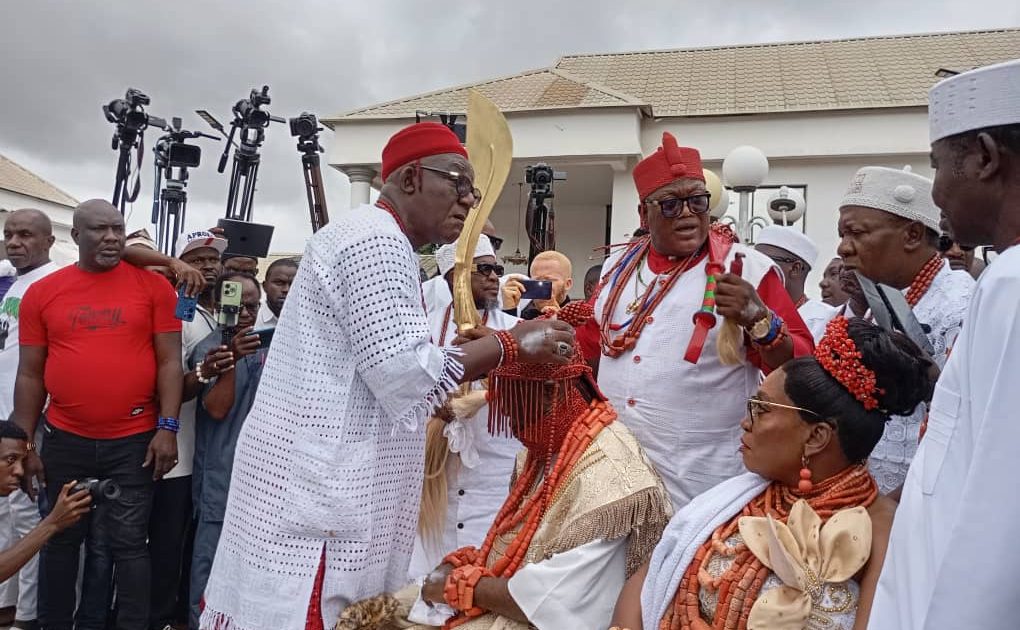The recent ascension of Obi Epiphany Azinge as the 14th Asagba of Asaba marks a significant moment in the city’s history. Following his oath of office, Azinge expressed his firm commitment to uphold a governance structure characterized by transparency and a strong stance against gossip within the palace. Recognizing the legacy of his predecessor, the late 13th Asagba, he paid tribute to his unmatched vision and leadership, urging his community to build upon the foundation he left. The new monarch emphasized the importance of unity and collaboration, signaling his intention to not only honor the past but also to engage actively with his people in shaping the future of Asaba.
In his inaugural address, Azinge articulated his dedication to fostering an environment where open communication and constructive criticism are welcomed. He pledged to maintain an open-door policy, inviting the citizens of Asaba to share their insights and suggestions, while simultaneously laying down a zero-tolerance policy towards palace gossip. By doing this, he aims to cultivate a culture of respect and accountability, ensuring that the royal palace remains a place for serious discourse and decision-making aimed at the greater good of Asaba. The establishment of these protocols highlights Azinge’s commitment to good governance, setting a precedent for future leadership in the region.
Azinge’s vision extends beyond the boundaries of palace politics; he hopes to leverage his connections to foster development in Asaba. He articulated a clear ambition to elevate the status of Asaba, one of Nigeria’s oldest cities, and restore its prominence. This vision encompasses not only infrastructural development but also cultural and economic advancement. The new Asagba invited former rivals and aggrieved participants of the recent chieftaincy contest to join him in a collaborative effort to propel Asaba forward. Recognizing that progress can only be achieved through collective effort, he emphasized the necessity of harnessing the talents and resources of all citizens.
The power transition ceremony was a notable occasion, attended by a diverse assembly of Asaba’s sons and daughters, as well as dignitaries from various spheres, including former Governor James Ibori. The colorful and dignified gathering reflected the community’s commitment to honoring their traditions while embracing the new leadership. Chief Ubaka Attoh, the kingmaker of Asaba, played a pivotal role in the proceedings, further solidifying Azinge’s legitimacy as the new Asagba. This event marked not only a change in leadership but also a reaffirmation of Asaba’s cultural identity and communal strength during this momentous transition.
As Azinge steps into his role, he plans to address the multitude of challenges faced by the community. He believes that the responsibilities of leadership are extensive and cannot be solely shouldered by one individual. Therefore, his appeal for the cooperation of all stakeholders is intended to foster a spirit of inclusivity among the people of Asaba. By acknowledging the participation and contributions of other members of the community, he seeks to build a unified front that can effectively tackle issues such as economic disparity, infrastructural deficits, and social cohesion that have long plagued the region.
In conclusion, Azinge’s installment as the 14th Asagba of Asaba heralds a new chapter for the city, with a focus on transparency, collaboration, and development. His commitment to a gossip-free palace and open governance sets a tone of accountability and inclusivity. By honoring his predecessors while calling for collective action among all citizens, Azinge aspires to elevate Asaba to its deserved stature. As he embarks on this journey of leadership, the eyes of the community will undoubtedly remain fixed on his actions, anticipating tangible outcomes that reflect his promises of progress and unity.


